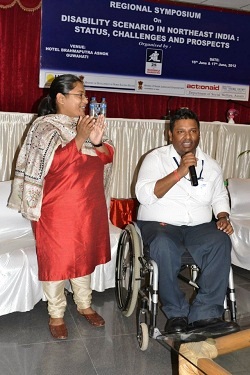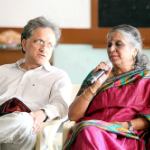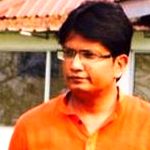POETRY EDITOR ANANYA S GUHA'S NOTE:
Anurag Rudra';s poems haunt you with sights, sound and smell of distant places, which he only heard of , but could not visit. It is history and memory which seeps into his veins instinctively. There is a sad lyricism about the poems, but they saunter, wander - touch and go. The poems are evocatively rhythmic, but transport you to a soft, ethereal world. It is not only nostalgia which is deep seated in his reasoning, but memory of touch, smell and nature. He recreates memory like dreams lined somewhere in the sub conscious like Jungian archetypes. Go ahead and enjoy reading these superbly crafted poems.
Epistle From An Outsider
(For maa and didu)
Part I
In the days of the Kacharis,
they say that this land was wild
with elephants across the banks Of the river.
That the sand was boned with buffalo skulls.
I found my ancestors' hoary skin
dumped on the rocky sand bed.
It was old, ancient.
Sometime in the days of the Bangladesh war,
they say that my ancestor spoke of Habiganj in his sleep.
When particularly fitful, he flapped his wings in sleep every morning.
(Hearsay has it that he escaped in a chicken coop from Sylhet)
How is it strange that when my grandfather was born, he let out,
amid the customary first wails, the name of Akhaura's biggest refugee camp?
Back where I come from, the day has clear distinct parts;
the geography marked by drought’s random cracks.
In the gardens of the Surma Valley, the air still smells of teak.
From where the Kushiara ends,I saw Bangladesh
standing upon my adolescent feet.
There are no elephants now on the other side of memory.
Part II
They say that her mind was clear and still when the water broke.
Clear as the Luba's skin. In my mind, I think I was dreaming:
suspended in pale liquid, I was zorbing in the placenta of history.
The first name I uttered was that of Mymensingh.
Here, the earth is fractured, ruptured, ruined.
They say that when grandmother heard of Mujbur's assaination,
she flapped her wings like a chicken and almost died.
(Hearsay has it that her husband escaped in a chicken coop from Sylhet)
I see myself in my grandfather's loins-
wading through the Luba's electric terrain.
When the British left, the Sahib left him a fridge
and a recommendation and two acres of khas land.
He died, bent over in the Sahib's chair, cigarette on his lips.
He had started speaking of going back.
(Somewhere, he would see)
Part III
When I leave home, mother has a catheter
implanted instead of a severed umbilical cord.
I am small and certain and the bus jerks at every pothole
and shrieks at Meghalaya's unforgiving terrain.
I am going somewhere at the end of the world.
When the world ends, I am nestled precariously
on the Khasi Hills' emaciated limbs
The world begins at Lokhra.
The earth here is jarred, the nerves a tangling of soot and string.
They say that when grandfather escaped from Sylhet,
he hid himself in a chicken coop. At Lakhtokia,
I stay near a butchers' for three years.
Unlike at Kachakanti Bari where the blade meets wood-
sharp, snappy and tight, at Lakhtokia, the drum quivers everyday
till dusk.
I see grandfather's throat slit every day at the hands of a butcher-
Bhatiyali on his lips
An Outsider Imagines His History
(For Didibhai, who shares my delusion)
In your letters you had written of forests and nymphs;
And the mighty Barak creeping against the muddy
flesh of her lover’s back. You had written of metaphors
blooming like krishnachuras and how you held a simile
in the cusp of your hands. And when for the first time you bled
this earth turned sweaty and limp; we garlanded you with
the fragrant blossoms of poems.
Eighty summers ago, my great grandmother crossed the river in a tori;
it had been raining for eight days. At night, when she turned
fish eyed from fever, they had nothing but the boatman’s
toki to wipe her with.
Now this is home; and for a melody, I have the cries of these alien
birds stuck in my head like an uncomfortable piece of shrapnel.
Back home, the betel-nuts are still ripe; her love still festive
as the songs of gypsies. But now, this is home. Like a gangrenous
scar, you have weeded me out like a telltale foetus from your womb.
Strangely, my ancestors no longer visit me.
No longer do I dream of that old house in Karimganj,
its coconut trees and snakes.
No longer do I hear grandma wail when my unborn
sibling haunts me in my dreams.
Only when I do think of Maa
does the earth tremble a little.
And it rains
Train from Karimganj
When I couldn't trace your bones in the ambiguous quicksand of memory,
I turned to the clouds.
They say that death precedes every ritual of longing and that grief is
always an algorithm of intimacy; that the insufferable inertia of loss
must always be suffered in private.
So you, who sang under the kodom trees by the beel
could now be found perched atop the thakurbari's ruins;
for company, the moon's incessant drumming.
Last November, we went to the railway station to catch a train that
was early by ten years; maybe twenty. On the way,
I feel the Kushiara's silent tug at my heels;
on my tongue, the air's salty exuberance.
On the way to Lumding, it rains and we see
steel parting the land like her scalp in a post bath ritual.
We stop in Jatinga; they say it is unusually cold this year. Even the
chorais have abandoned their nests in the station master's cabin.
In the drawer of the booking clerk's cubicle, I find your letters from
home. The air is thin as laughter and on the phone, I can hear the
operator connecting me to another season of longings.
''Train's running late. Landslide'', says the station master and smiles.
Back home in Karimganj,
already a hundred miles back,
the birds are still singing.
Letter to Leenalaya,
(Azad Sagar Road, Karimganj)
I no longer dream of you. This night spreading
its tentacles in the dark can no longer terrorize
you into a frightened pigeon about to slaughtered.
Instead, I dream of that old house in Karimganj-
Its drains filled with gold skinned snakes. The rain
piercing through the canopy of coconut and laburnum.
Sometimes, I dream of dida, her hair spread open
like a carpet from Samarkand. In the ripeness of
the berries, I see choto mama’s tumours burst open
as he turned in his sleep.
For many years after he died, I dreamt of dadu
sleepwalking in the moss covered backyard of that
house; his larynx rising and falling as he slowly
walked himself to death in his sleep.
In the throes of pleasure, I have often heard
dida's howls as she resisted a snake being
pushed into her nasal cavity. I don’t know where I have
seen you, baba, old and broken as you cried yourself
to sleep.
Now all of you stay with me, never to return. Never will
we return to that old house in Karimganj, its mossy
corridors and walls flaking off like a leprous hide.
Never will another corpse leave the house every Puja,
for the nilmoni road shawshan,
the unanimous choice of the family.
Now earthworms dig clandestine tunnels under where
once the deity’s autumnal curse reigned supreme.
There, when the night hangs in the darkness of slumber,
the nightmares begin.
After the storm ends
Between the hand and the mouth,
the heart can only say so much.
For catharsis is difficult and one must
remain content with the ominous
foreboding of palsy.
Last summer, she came looking for you
in what was once home. We sat
and talked under the krishnachura you had planted.
And then it rained.
And there was poetry.
In the heat's turgid moment, a mango
falls to the earth.
Apparently, in Eden, nothing but a mango
falls anymore. And man need not succumb
to the narrative's dark pledges to be damned.
Apparently, there are no dicey fruits and the serpent
must only be so evil as not to disturb the frail
equilibrium of love and damnation.
Somewhere else, the world is still flat
and there are no reasons for happenings.
Where love is still ample and your beloved
not swallowed by the earth's ever hungry orifice.
I see your fingers and I am,
once again, at the same time,
man and child.
For speech is difficult and one must understand
the unlettered syllable's significance.
Tonight, we travel to the sea.







































